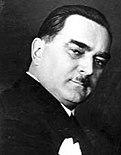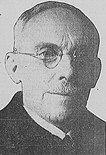| ||||||||||||||||||||||||||||
All 373 seats to the Narodna skupština | ||||||||||||||||||||||||||||
|---|---|---|---|---|---|---|---|---|---|---|---|---|---|---|---|---|---|---|---|---|---|---|---|---|---|---|---|---|
| Turnout | 74.5% | |||||||||||||||||||||||||||
| ||||||||||||||||||||||||||||
| ||||||||||||||||||||||||||||
Parliamentary elections were held in Yugoslavia on 11 December 1938.[1] The result was a victory for the governing Yugoslav Radical Union, which won 306 of the 373 seats in Parliament.
These would be the last elections held in Yugoslavia before World War II. By the time of the first postwar elections, in 1945, a Communist regime was rapidly consolidating, and the non-Communist opposition boycotted the vote after claiming to have been targeted with severe intimidation.[2] As a result, the 1938 elections would be the last multi-party elections held in Yugoslavia until the Communists gave up their monopoly of power in 1990.[3]
Coalitions
The Yugoslav Radical Union (JRZ, Jereza) led by PM Milan Stojadinović, form an right-wing alliance with:
- Yugoslav National Party led by Bogoljub Jevtić,
- Yugoslav Muslim Organization led by Mehmed Spaho,
- Slovene People's Party led by Anton Korošec and
- People's Radical Party led by Aca Stanojević, which later leaves the alliance in favor of the United Opposition.
The United Opposition alliance was consisted of:
- Croatian Peasant Party led by Vladko Maček
- Independent Democratic Party led by Srđan Budisavljević
- Democratic Party led by Ljubomir Davidović
- Agrarian Party led by Jovan Jovanović Pižon
- Montenegrin Federalist Party led by Sekula Drljević
Results
| Party | Votes | % | Seats | +/– |
|---|---|---|---|---|
| Yugoslav Radical Union | 1,643,783 | 54.1 | 306 | +3 |
| United Opposition | 1,364,524 | 44.9 | 67 | 0 |
| Yugoslav National Movement | 30,734 | 1.0 | 0 | 0 |
| Total | 3,039,041 | 100 | 373 | +3 |
| Registered voters/turnout | 4,080,286 | 74.5 | – | – |
| Source: Nohlen et al. | ||||
Aftermath
Although the United Opposition, de facto led by Maček, had attracted 44.9% of the vote, due to the electoral rules by which the government parties received 40% of the seats in the National Assembly before votes were counted, the opposition vote only translated into 67 seats out of a total of 373.[4]
Following the election, there was a faction led by the commander of the Royal Yugoslav Air Force (VVKJ), General Dušan Simović, that contemplated a pro-Serb coup. Simović had been involved in similar plotting earlier in the year.[5]
Sources
- Onslow, Sue (March 2005). "Britain and the Belgrade Coup of 27 March 1941 Revisited" (PDF). Electronic Journal of International History. University of London (8): 359–370. ISSN 1471-1443.
- Ramet, Sabrina P. (2006). The Three Yugoslavias: State-Building and Legitimation, 1918–2005. Bloomington, Indiana: Indiana University Press. ISBN 978-0-253-34656-8.
References
- ^ Dieter Nohlen, Dolf Sternberger, Bernhard Vogel, Klaus Landfried (1969) Die Wahl der Parlamente und andere Staatsorgane, Walter de Gruyter, p784
- ^ "Elections In Yugoslavia", The Times, 9 November 1945
- ^ Rome Tempest (January 23, 1990). "Communists in Yugoslavia Split Into Factions". Los Angeles Times.
- ^ Ramet 2006, p. 104.
- ^ Onslow 2005, p. 37.

